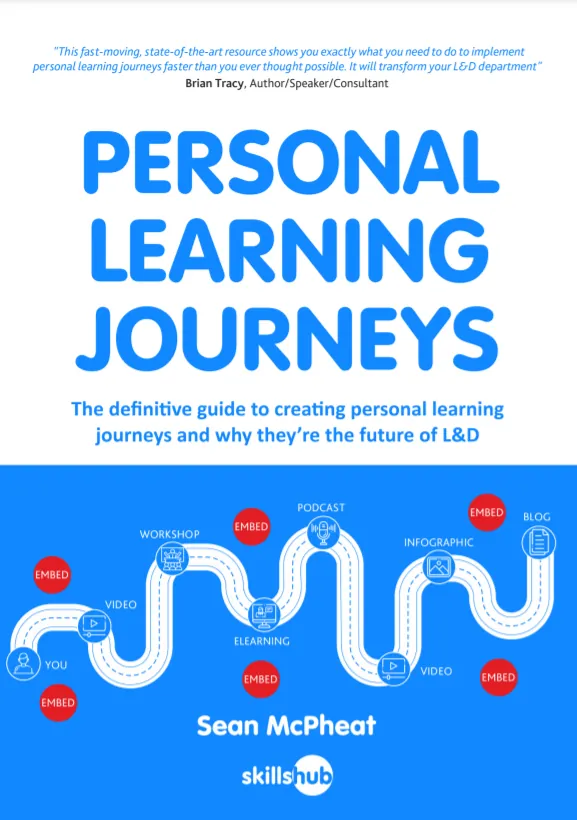
2025 is shaping up to be a turning point for careers, with rapid advances in technology, automation, and hybrid work.
Staying competitive means focusing on skills that align with these changes whether it’s mastering AI tools, building resilience, or thriving in a flexible job market. Now’s the time to future-proof your career.
The good news? Building those skills has never been easier. With so many online resources, you can learn on your own terms… and at your own pace.
Stay consistent, and you’ll set yourself up for success that lasts!

Why Learning New Skills is Essential for Career Development
The rapid evolution of technology and shifting workplace norms demand that professionals remain adaptable. Investing in skill development not only ensures you stay relevant but also enhances your employability, earning potential, and resilience in the face of economic uncertainty.
Learning new skills contributes to personal growth, strengthens problem-solving, and creates innovation.
As industries embrace advances like AI and hybrid working models, a robust skill set will allow you to thrive in evolving environments. The harsh reality is that data automation, AI, and robotics will inevitably replace many low-level positions, freeing up workers to take more challenging roles. However, at present the job market is highly competitive, as worker supply begins to outstrip demand.
McKinsey and Company wrote in December 2024 that “between 400 million and 800 million individuals could be displaced by automation and need to find new jobs by 2030 around the world.”
For these reasons, learning is no longer something we do in our youth before we settle comfortably into predictable careers. Given the rapid pace of change we are experiencing, in workplace structure and technological innovation, skills expansion is now a lifelong necessity.
But how do you decide between the many possible courses you might take? Let’s turn to that next.
Key Factors to Consider When Choosing Skills to Learn
When deciding which skills to prioritise, consider the following:
- Relevance to Industry Trends: Focus on skills aligned with your field or emerging opportunities. Look at journals of record within your field and their recruitment predictions.
- Personal Development Skills: Choose areas you’re enthusiastic about to sustain motivation. If you have no inherent interest in the subject, you won’t feel motivated to keep up with trends and developments.
- Transferability: Opt for skills that apply across roles and industries. With redundancies and mergers on the rise, it pays to have a skillset that applies across a range of industries or sectors.
- Future Demand: Investigate projections from industry reports and thought leaders. Look at large scale HR studies, such as those produced by Gartner, McKinsey, and Forbes.
We’ve saved you a little time by distilling the insights from some of these sources. Here we present our rundown of those trending skills for professionals.

Top 24 Skills to Learn for Career Growth in 2025
In this section, we’ll highlight both technical and soft skills that are projected to be game changers in 2025.
1. Data Analytics and Interpretation
Data analysis skills are at the heart of decision-making in modern businesses. Understanding how to analyse and interpret data equips professionals to extract actionable insights, driving strategic decisions across industries.
Learning how to use key analytic tools, particularly in marketing, can add considerable interest to your resume.
2. Artificial Intelligence (AI) Literacy
With AI applications permeating sectors from healthcare to marketing, learning AI fundamentals, including tools like machine learning and natural language processing, can set you apart.
Both comprehending the basics of how LLMs operate and learning how to prompt generative AIs to deliver usable results, are increasingly important skills.
3. Cybersecurity Expertise
As digital transformation accelerates, so do cyber threats. Developing skills in cybersecurity will be critical for safeguarding sensitive information in hybrid work environments.
New frontiers in cybersecurity include using the blockchain to preserve intellectual property and developing cryptographic for the quantum computers of the future. It’s an increasingly exciting and vital sector.
4. Digital Marketing Proficiency
The demand for digital marketing expertise—particularly in SEO, social media strategies, and analytics—remains high. Staying updated on trends like AI-powered marketing will add value to your profile.
Personalisation and influencer partnerships are continuing trends in marketing, and understanding these new strategies and markets is essential if you work in this sector.
5. Adaptability and Resilience
Soft skills like adaptability and resilience are vital for navigating a fast-changing world. Using these qualities can help you tackle challenges and seize opportunities.
Learning to love change is an important attitude shift we may all have to learn in 2025 and beyond.
6. Communication and Collaboration
Whether you’re in-person or remote, effective communication skills paired with an ability to collaborate effectively are indispensable for success.
Learning how to use remote working tools such as Zoom, Trello, Notion and other platforms for distributed project management is beneficial. Increasingly, project teams may include in-person and remote elements and stakeholders.
7. Project Management
Agile project management is increasingly valuable, especially in tech-driven sectors. Certifications like PMP or Scrum Master can enhance your qualifications.
In 2023, the World Economic Forum predicted growth within the project management sector, predicting an 80% growth in this sector between 2023-2027.
8. Emotional Intelligence (EQ)
EQ is a differentiator in leadership and teamwork. Learning to manage your emotions and empathise with others boosts your workplace effectiveness.
This skill becomes especially challenging when so many teams include hybrid working patterns or remote workers. Making sure everyone is equally included, listened to, and supported is a unique skill which should be much in demand in the coming decade.
9. Programming and Development
From Python to full-stack development, programming skills remain highly sought after. Emerging areas like blockchain development and LLM training are particularly lucrative.
GeeksforGeeks.org included data structures and algorithms, encryption and cryptography, and source control (using open-source platforms such as GitHub) as their most in-demand and future-proof skills for 2025.
10. Green Skills
As sustainability gains prominence, skills like environmental impact assessment and renewable energy knowledge are becoming indispensable.
In 2025 every company is expected to have an Environmental, Social, and Governance (ESG) policy. As well as being good for the planet, having such policies expands collaborative opportunities and allows for public-private partnerships and funding opportunities.
The drafting, monitoring and maintenance of such policies will be a significant role within forward-thinking businesses.
11. Creative Problem-Solving Skills
Employers value innovative thinkers who approach challenges with creativity. This skill transcends industries and roles.
It isn’t as simple as jumping in with innovative solutions, however. A recent Harvard Business Review article discusses the process of ‘problem framing,’ which involves “looking at a problem from a variety of perspectives,” which “lets you uncover new insights and generate fresh ideas.”
Consultancies offering complex problem solving and critical thinking skills will be much in demand in the increasingly complex and fast-moving business environment of the future.
12. Hybrid Work Management
Mastering tools and techniques for remote collaboration, like asynchronous communication and productivity software, will help you excel in flexible work models.
It’s no longer enough to be able to master the green screen settings on Zoom. Virtual workplaces of the future allow for screen-sharing, virtual whiteboards, instant document transfer and other features.
Familiarising yourself with such systems may give you an advantage over candidates less used to working this way.
13. Cloud Computing Proficiency
With businesses relying heavily on cloud infrastructure, understanding platforms like AWS, Azure, or Google Cloud can significantly boost your career development.
Make sure you understand the security and access issues that can trouble such platforms, giving prospective employers the confidence that you’ll be a safe pair of hands when entrusted with invaluable documents and IP.

14. UX/UI Design
As user experience becomes a competitive differentiator, learning UX/UI design principles and tools like Figma or Adobe XD is invaluable, especially in tech and e-commerce industries.
The internet of things (IoT) and voice activation are increasingly prevalent developments in user interfaces, so it’s no longer enough to master on screen UX. Also consider developments in the metaverse, VR and augmented reality, which continue to offer great promise.
15. Financial Literacy
Understanding financial principles such as budgeting, investing, and cost analysis helps professionals make informed decisions and adds strategic value to teams.
These are evergreen skills which become more complex when payroll must consider globally distributed workforces, and budgeting must allow for variable exchange rates in multinational ventures.
16. Sales Enablement Skills
Career-boosting skills like lead generation, CRM management, and data-driven sales strategies remain crucial for driving revenue in competitive markets.
Many companies have begun to use virtual assistants, generative AI, and other innovations to assist sales teams. Becoming familiar with the most popular of these can convey a competitive edge.
Sales analytics is a growing field, with Statista predicting a market evaluation of $132 billion for Analytics as a Service (AaaS) by 2032 (a trebling in size from 2025).
17. Foreign Language Proficiency
Globalisation increases the value of multilingual professionals. Languages like Mandarin, Spanish, or German can open doors to international opportunities.
A British Council study from 2023 found a significant deficiency in the number of school students learning a second language to proficiency.
They wrote “With fewer people taking languages in school, fewer people go on to study a language at university. This results in fewer people, from a broad range of backgrounds going into the professions where language skills are key – such as teaching, diplomacy, and business.”
If you have such skills or are able to brush up on your High School German, then you are already ahead of the curve.
18. Diversity, Equity, and Inclusion (DEI) Expertise
Organisations are prioritising inclusive workplaces. Knowledge of DEI strategies enhances leadership capabilities and workplace harmony.
This is a continuing trend from the last decade and will be increasingly important as workplaces change due to the widespread adoption of AI and automation. 160 million clerical roles, traditionally performed by female workers, may be under threat by 2030, according to McKinsey.
Such large-scale social changes will require a significant rethink of the modern workplace, and its accessibility.
Ready to make your workplace more inclusive? Discover how eLearning for Dyslexic Employees can help you create a supportive and accessible environment for everyone.
19. Conflict Resolution
In hybrid and diverse workplaces, the ability to mediate and resolve conflicts is essential for maintaining productivity and team cohesion.
The ability to deliver such services remotely will be increasingly in demand when teams can be distributed across time zones.
20. Video Production and Editing
With video content dominating marketing strategies, skills in production, editing, and tools like Final Cut Pro or Adobe Premiere are in demand.
The use of AI tools such as Sora, Midjourney, and Dall-E is a growing trend, allowing even small brands to create impressive graphics and increasingly human-sounding voice overs without recourse to epic budgets.
The ability to create campaigns from your laptop, or even phone, gives you a distinct advantage over creatives locked into a particular facility house.
21. Customer Relationship Management (CRM)
Mastering CRM tools such as Salesforce or HubSpot is critical for improving customer experiences and driving business growth. This has been the case for a decade or more and shows no sign of abating in 2025 and beyond.
22. Strategic Thinking
The ability to see the bigger picture and make long-term plans is a key leadership skill in today’s uncertain and competitive markets.
Keeping on top of contemporary trends in ways of working, such as using agile workforces, or remote workplaces, conveys a distinct edge.
23. Supply Chain Management
Understanding supply chain logistics, inventory control, and procurement processes is valuable, particularly in retail, manufacturing, and e-commerce.
Major vulnerabilities in global supply chains have been revealed in recent years, from PPE shortages during the COVID-19 pandemic, to tariff wars between the US and China.
Learning how to use supply chain automation and delivery orchestration to modernise your supply chain is important given such constraints and crises.
24. Ethical AI and Technology Governance
As AI becomes more prevalent, knowledge of ethical frameworks and governance strategies is becoming a sought-after skill for ensuring technology aligns with societal values.
There’s an increasing realisation that, for all its advantages and innovations, AI and its automations will inevitably lead to large-scale social change. Navigating these complexities will be a key skill in 2025 and beyond.
From writing ethical AI policies, to monitoring algorithmic performance, to creating more empathic AI systems, there is a lot of work to be done, and a lot of opportunities to be seized in this field.

Tips for Staying Consistent with Skill Development
The journey of skill acquisition requires a plan. Once you have identified the skills that both align with your interests and provide economic opportunities, you need a plan of attack.
Here’s how to stay on track:
1. Set Realistic Goals
Define clear, measurable objectives. Break down large goals into smaller milestones to maintain progress. Ensure deadlines are realistic and you allow time for new skills to bed in before you attempt to sell those acquired abilities.
2. Use Online Resources and Tools
Platforms like Coursera, LinkedIn Learning, and Skillshare offer affordable courses tailored to your needs. Explore industry-specific webinars and workshops as well. Be careful when sourcing new skills from random YouTubers, and prefer instead reliable, peer-reviewed skills hubs.
3. Track Your Progress
Use tools like spreadsheets, journals, or apps to monitor your learning journey. Regularly revisit your goals to stay on track. Don’t be too harsh on yourself if you’re struggling with a radically new skill. Instead, slow down, backtrack, and make sure you understand each module or lesson before moving on.
4. Network with Experts
Engage with mentors, industry leaders, and peers who can provide guidance, feedback, and accountability. If you can, consider attending in-person events where you’ll get to meet like-minded learners and educators.
5. Seeking Feedback
Request constructive feedback on your new skills and apply it to refine your abilities further. The best online courses allow for some one-to-one tile with a virtual tutor.
The Long-Term Impact of Learning New Skills
There are two main reasons for acquiring new skills, no matter your level of seniority (or your age). Old dogs can and should learn new tricks.
The two main reasons to learn are for self-improvement and for economic advantage:
- Revealing New Opportunities: Ongoing learning can open doors to roles you never envisioned, from promotions to career pivots.
- Adapting to Future Market Changes: By anticipating trends, you can proactively prepare for shifts in your industry, positioning yourself as an innovator.
Remember… Workplace Learning is Lifelong
Investing in your skills is an investment in your future.
Whether you choose to focus on bespoke eLearning, explore engaging eLearning content, or enhance your capabilities through an intuitive eLearning Platform, the steps you take today will shape your career tomorrow.
Stay ahead, stay adaptable, and embrace the lifelong journey of learning.














